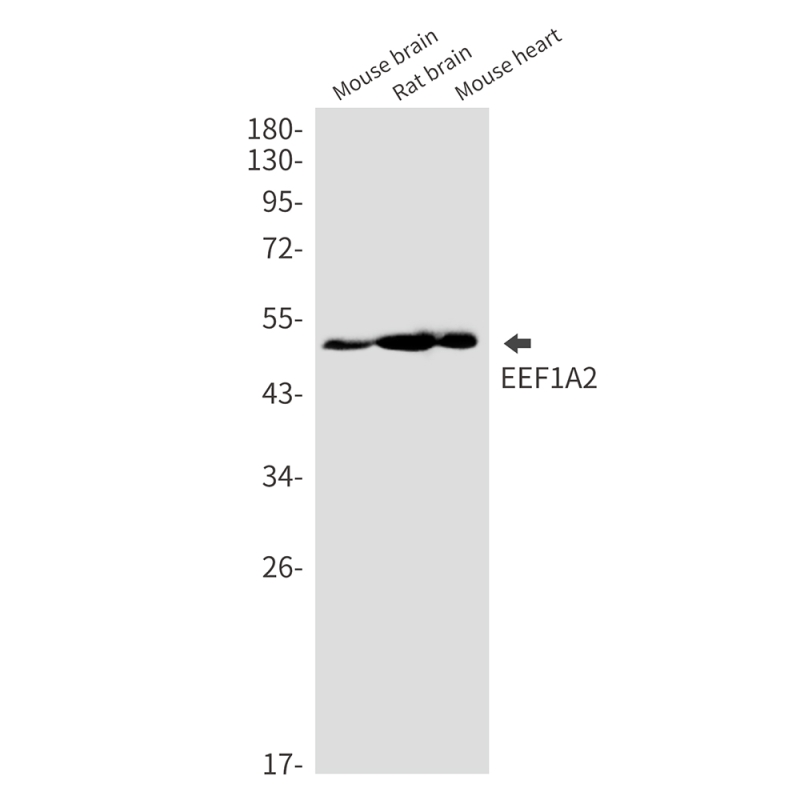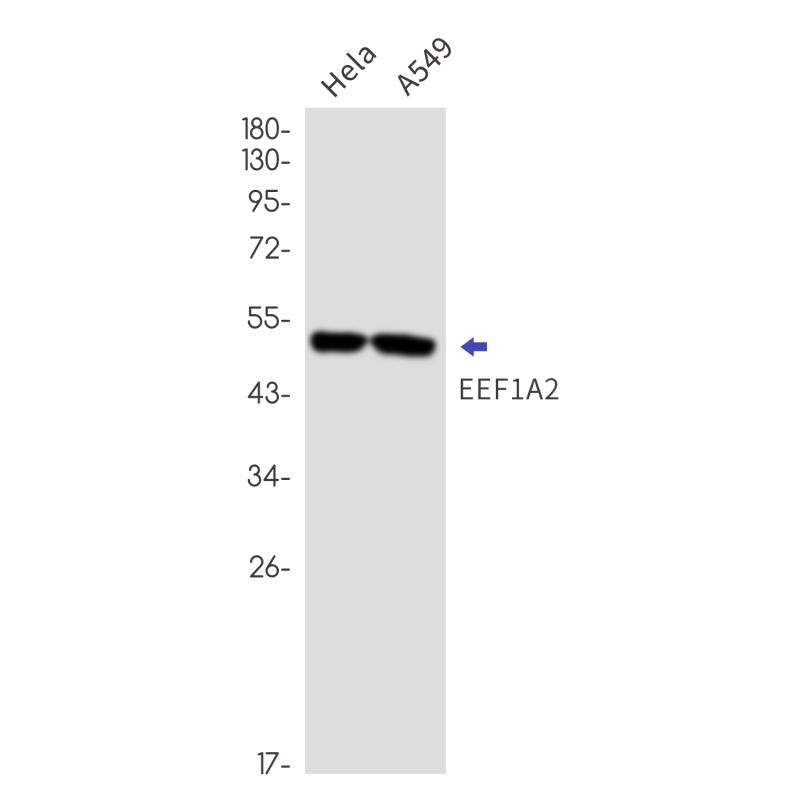

| WB | 1/500-1/1000 | Human,Mouse,Rat |
| IF | 1/20 | Human,Mouse,Rat |
| IHC | 咨询技术 | Human,Mouse,Rat |
| ICC | 技术咨询 | Human,Mouse,Rat |
| FCM | 咨询技术 | Human,Mouse,Rat |
| Elisa | 咨询技术 | Human,Mouse,Rat |
| Aliases | HS1; STN; EF1A; STNL; MRD38; EEF1AL; EIEE33; EF-1-alpha-2 |
| Entrez GeneID | 1917 |
| WB Predicted band size | Calculated MW: 50 kDa; Observed MW: 50 kDa |
| Host/Isotype | Rabbit IgG |
| Antibody Type | Primary antibody |
| Storage | Store at 4°C short term. Aliquot and store at -20°C long term. Avoid freeze/thaw cycles. |
| Species Reactivity | Human,Mouse,Rat |
| Immunogen | A synthetic peptide of human EEF1A2 |
| Formulation | Purified antibody in TBS with 0.05% sodium azide,0.05%BSA and 50% glycerol. |
+ +
以下是关于Elongation Factor 1A2(EF-1A2)抗体的3篇参考文献及其摘要内容:
1. **"Characterization of elongation factor 1A-2 as an oncoprotein in human ovarian cancer"**
- **作者**: Annereau JP, et al.
- **摘要**: 该研究首次报道EF-1A2在卵巢癌中特异性高表达,并利用特异性抗体通过Western blot和免疫组化验证其作为潜在癌症标志物的作用。
2. **"Differential expression of the elongation factor 1A-1 and 1A-2 isoforms by a monoclonal antibody"**
- **作者**: Lamberti A, et al.
- **摘要**: 开发了一种单克隆抗体,能够区分EF-1A1和EF-1A2两种高度同源的亚型,揭示了二者在正常组织和肿瘤中的差异表达模式。
3. **"Structural and functional analysis of the human elongation factor 1A2 oncogene"**
- **作者**: Soares DC, et al.
- **摘要**: 通过抗体验证了EF-1A2的晶体结构及其在肿瘤细胞中的功能,证明其异常表达与细胞增殖和迁移相关。
以上文献涵盖EF-1A2在癌症中的作用、抗体特异性开发及结构功能研究,适用于实验设计或文献引用。
The Elongation Factor 1A2 (EF1A2) antibody is a tool used to detect EF1A2. a tissue-specific isoform of the eukaryotic translation elongation factor 1A family. EF1A proteins facilitate the GTP-dependent delivery of aminoacyl-tRNA to ribosomes during protein synthesis. While EF1A1 is ubiquitously expressed, EF1A2 is predominantly found in neurons, muscle, and certain cancers, replacing EF1A1 in these tissues post-development. This restricted expression suggests specialized roles in cellular processes beyond translation, such as cytoskeletal regulation, apoptosis, and signal transduction.
EF1A2 has gained attention due to its oncogenic potential. Overexpression is linked to cancers like ovarian, pancreatic, and hepatocellular carcinoma, where it promotes proliferation, metastasis, and chemoresistance. In neuroscience, EF1A2 mutations are associated with neurodevelopmental disorders, including epilepsy and intellectual disability.
Antibodies targeting EF1A2 enable researchers to study its expression patterns, subcellular localization, and disease-related mechanisms via techniques like Western blot, immunohistochemistry, and immunofluorescence. Specificity is critical, as EF1A2 shares ~90% amino acid identity with EF1A1. High-quality antibodies distinguish between these isoforms, aiding investigations into EF1A2's dual roles in physiological processes and pathology. Its unique expression profile also positions EF1A2 as a potential diagnostic or therapeutic target in cancer and neurological diseases.
×